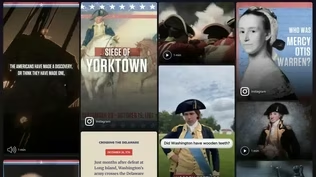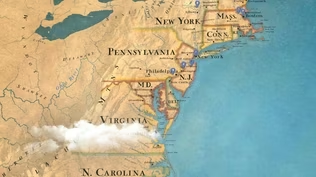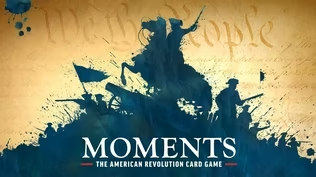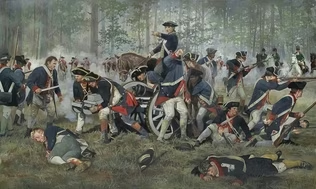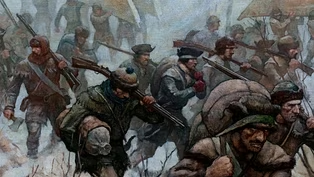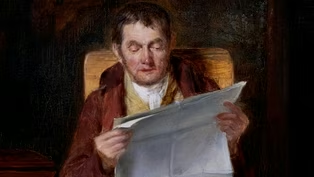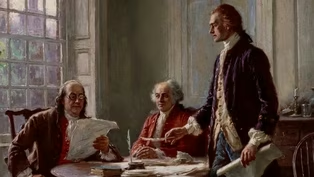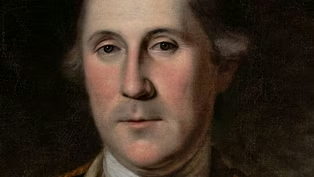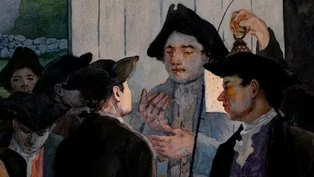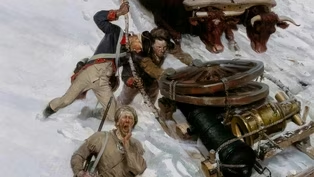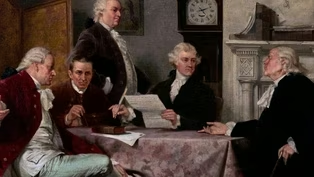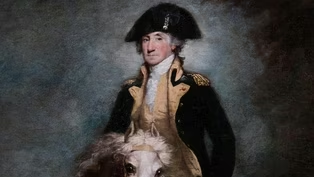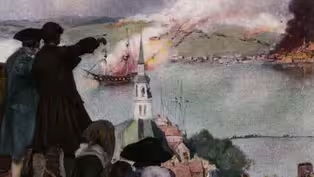
Dunmore's Proclamation & Black Americans in the Revolution
Clip: Episode 2 | 9m 20sVideo has Closed Captions
Royal governor Lord Dunmore offers freedom to enslaved people that fight their Patriot masters.
Forty percent of white Virginians owned enslaved people, and farmers like George Washington lived in fear of a revolt. These fears come to reality when Virginia's royal governor, Lord Dunmore, issues a proclamation offering freedom to any enslaved individual who joins his fight against their Patriot masters. Some 800 men would join Dunmore, including some of George Washington's own slaves.
Problems playing video? | Closed Captioning Feedback
Problems playing video? | Closed Captioning Feedback
Episodes presented in 4K UHD on supported devices. Corporate funding for THE AMERICAN REVOLUTION was provided by Bank of America. Major funding was provided by The Better Angels Society and...

Dunmore's Proclamation & Black Americans in the Revolution
Clip: Episode 2 | 9m 20sVideo has Closed Captions
Forty percent of white Virginians owned enslaved people, and farmers like George Washington lived in fear of a revolt. These fears come to reality when Virginia's royal governor, Lord Dunmore, issues a proclamation offering freedom to any enslaved individual who joins his fight against their Patriot masters. Some 800 men would join Dunmore, including some of George Washington's own slaves.
Problems playing video? | Closed Captioning Feedback
How to Watch The American Revolution
The American Revolution is available to stream on pbs.org and the free PBS App, available on iPhone, Apple TV, Android TV, Android smartphones, Amazon Fire TV, Amazon Fire Tablet, Roku, Samsung Smart TV, and Vizio.
Buy Now
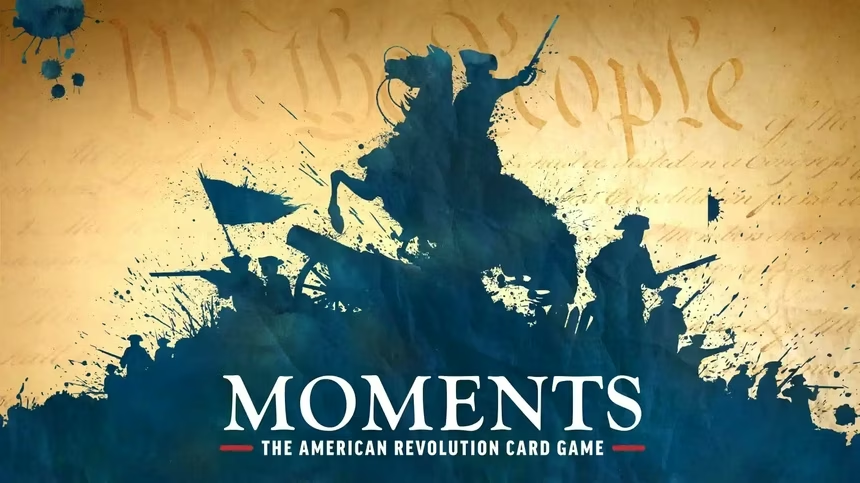
MOMENTS: The Revolutionary War Card Game
Use your knowledge of Revolutionary-era moments to build a timeline of real historical events.Providing Support for PBS.org
Learn Moreabout PBS online sponsorship♪ Voice: When you make men slaves, you deprive them of half their virtue, and compel them to live with you in a state of war.
Are there no dangers attending this mode of treatment?
Are you not hourly in dread of an insurrection?
Olaudah Equiano.
Narrator: The growing talk of "liberty" had appealed to those who had the least of it and craved it most.
From New England to South Carolina, enslaved people offered to help the British if they were granted freedom.
In November of 1775, Virginia's Royal Governor Lord Dunmore, who had been forced to flee with some 300 soldiers, sailors, and Loyalists to ships anchored in the Chesapeake Bay, issued a Proclamation that seemed to confirm the slaveholders' worst nightmares.
It promised freedom to any enslaved man owned by a rebel who was willing to take up arms and help suppress the uprising.
Atkinson: Britain is the biggest slave-trading nation on earth.
Nevertheless, the British believe that if they can convince enough slaves to abandon their masters in the South, to take up arms against the American rebels, that this is a manpower pool that can also derange the economies of the Southern states.
It's not that the British are anti-slavery, by any means, in the 1770s, right?
Their colonies in the Caribbean are their most profitable colonies in the Americas.
They are firmly committed to slavery.
But, opportunistically, when they think that they can encourage slaves to rise up against rebelling colonists, they'll do so.
Annette Gordon-Reed: For enslaved people, this was a way of getting out of a situation that seemed intractable.
And it gave them an impetus to get involved in all of this.
In the sort of chaos of war, they found an opportunity, a way to escape their situation.
Voice: "The Virginia Gazette."
Be not then, ye Negroes, tempted by this proclamation to ruin yourselves.
Whether you will profit by my advice, I cannot tell.
But this I know, that whether we suffer or not, if you desert us, you most certainly will.
Narrator: Dunmore's Proclamation helped drive Southern slaveholders to the side of the revolutionaries.
Edward Rutledge of South Carolina spoke for many: Lord Dunmore's proclamation tends "in my judgment, "more effectually to work an eternal separation "between Great Britain and the Colonies than any other expedient."
Dunmore says that he only wants the slaves of rebels to join him.
Not clear exactly how you can tell them apart, or whether there's any kind of census going on of who do you belong to.
Narrator: Dunmore was not an abolitionist; he did not free any of the 57 human beings he held in slavery himself; the Patriots would capture them all and sell them to fund their cause.
Voice: Wednesday.
Last night after going to bed, Moses, my son's man, Joe, Billy, Postillion, John, Mulatto Peter, Tom, Panticore, Manuel, and Lancaster Sam all ran away to Lord Dunmore.
Landon Carter.
Narrator: Now runaways streamed to the governor's ships, silently slipping along the rivers and tidal creeks that opened into the Chesapeake Bay.
87 men, women, and children from a single Virginia plantation fled to Dunmore.
[Dogs barking] Voice: Ran off last night from the subscriber: a Negro man named Charles, who is a very shrewd, sensible fellow, and can both read and write.
There is reason to believe he intends an attempt to get to Lord Dunmore.
His elopement was from no cause of complaint, or dread of whipping but from a determined resolution to get liberty, as he conceived.
["The Virginia Gazette"] Narrator: "There is not a man among them," George Washington's farm manager warned him, "but would leave us if they believed "they could make their escape.
Liberty is sweet."
He was right.
The first enslaved person to escape Mount Vernon was named Harry Washington.
Born somewhere near the Gambia River in West Africa, he was captured, carried across the ocean, and, in 1763, purchased by George Washington.
Freedom was never far from his mind.
In 1771, he had tried to escape but was caught and brought back.
4 years later, he saw his chance.
Erica Dunbar: Following Lord Dunmore's proclamation, Harry Washington knew that this would be an opportunity, and he joined the British against the people who had once owned him.
Narrator: George Washington called Lord Dunmore a "Monster," and an "arch-traitor to the rights of humanity."
Voice: If that man is not crushed before spring, he will become the most formidable enemy America has.
His strength will increase, as a snowball, by rolling, and faster.
Nothing less than depriving him of life or liberty will secure peace to Virginia.
[George Washington] Narrator: Scores of runaways were caught and brutally punished; some were killed, others sold off to compensate their enslavers.
But some 800 men would make it to Dunmore's growing fleet, along with roughly the same number of women and children.
Men found fit for duty were enlisted in a special unit called "Dunmore's Ethiopian Regiment."
They were commanded by White officers but paid a wage for the first time in their lives.
Voice: The proclamation has had a wonderful effect.
The Negroes are flocking in from all quarters.
And had I but a few more men here, I would march immediately to Williamsburg, by which I should soon compel the whole colony to submit.
Lord Dunmore.
Narrator: Bolstered by reinforcements, Dunmore occupied Norfolk and ordered a stockade built at the Great Bridge over the Elizabeth River to block the only road to town from the South.
Some 700 Patriots dug in across the river, and on December 9, 1775, when Dunmore's troops charged across the bridge to dislodge them, more than 100 of his men, Black and White, were killed.
[Gunfire] "They fought, bled, and died like Englishmen," one man remembered.
Dunmore's makeshift army-- including what was left of the Ethiopian regiment-- fled back to sea.
With them went scores of Loyalist families from in and around Norfolk, most of them Dunmore's fellow Scots.
He now commanded a floating city--including rafts on which the poorest struggled to survive.
Christopher Brown: Dunmore's Proclamation turns the conflict, in Virginia, into a genuine crisis.
But it does help clarify differences, right?
It establishes that there is one side of this conflict that is unevenly committed to slavery.
And then there's another side, our side, which is fully committed to it.
And for some Patriots, that's all they need to know.
It creates a sense that this is an existential conflict in a way that it had not before.
Voice: These lords of themselves, these kings of me, these demigods of independence.
It has been proposed that the slaves should be set free, an act which, surely, the lovers of liberty cannot but commend.
How is it that we hear the loudest yelps for liberty among the drivers of Negroes?
Dr.
Samuel Johnson.
♪
Video has Closed Captions
Clip: Ep2 | 8m 18s | Benedict Arnold's army braves the fierce winter to attack Quebec City in Canada. (8m 18s)
"Common Sense" and the Birth of a New World
Video has Closed Captions
Clip: Ep2 | 6m 36s | "Common Sense" awakens the American colonies to the idea of true independence. (6m 36s)
The Declaration of Independence & Birth of the United States
Video has Closed Captions
Clip: Ep2 | 11m 47s | Thomas Jefferson writes the Declaration of Independence and proclaims all men are created equal. (11m 47s)
George Washington: Farmer, Patriot, Commander
Video has Closed Captions
Clip: Ep2 | 4m 56s | George Washington assumes command of the Continental Army and must turn it into a unified force. (4m 56s)
John Peters... an enemy to Congress?
Video has Closed Captions
Clip: Ep2 | 2m 5s | John Peters was the most respected man in his small settlement until the First Continental Congress. (2m 5s)
One of the Most Extraordinary Expeditions in American History
Video has Closed Captions
Clip: Ep2 | 6m 56s | Henry Knox leads a daring expedition to deliver artillery from Fort Ticonderoga to Boston. (6m 56s)
Preview: An Asylum for Mankind
Video has Closed Captions
Preview: Ep2 | 30s | Washington takes command of the Continental Army. Congress declares American independence. (30s)
Video has Closed Captions
Clip: Ep2 | 52s | Extolling Washington's qualities in leadership, command and mental faculties. (52s)
Bunker Hill Aftermath, June 17, 1775
Video has Closed Captions
Clip: Ep2 | 57s | On June 17, 1775, the British took the high ground, but at tremendous cost. (57s)
Providing Support for PBS.org
Learn Moreabout PBS online sponsorshipSupport for PBS provided by:
Episodes presented in 4K UHD on supported devices. Corporate funding for THE AMERICAN REVOLUTION was provided by Bank of America. Major funding was provided by The Better Angels Society and...

